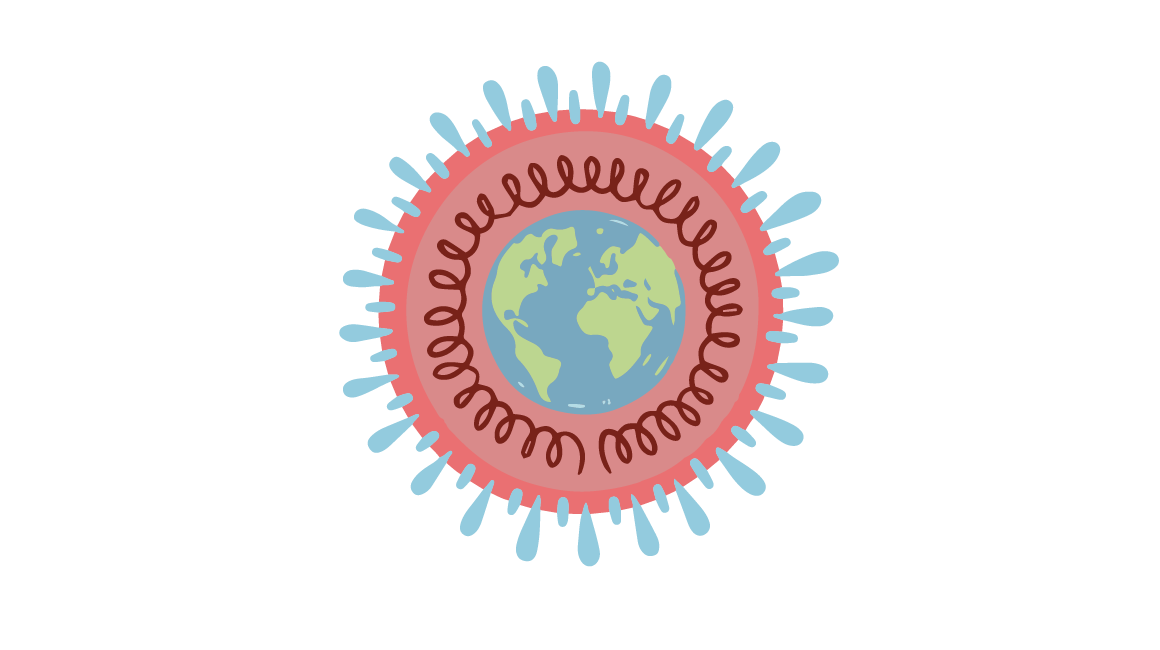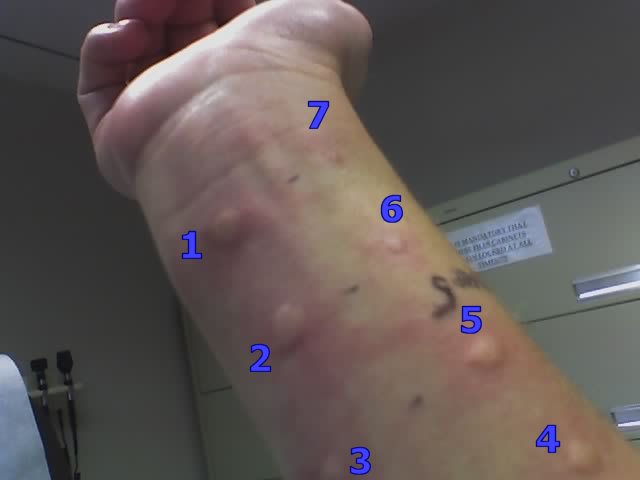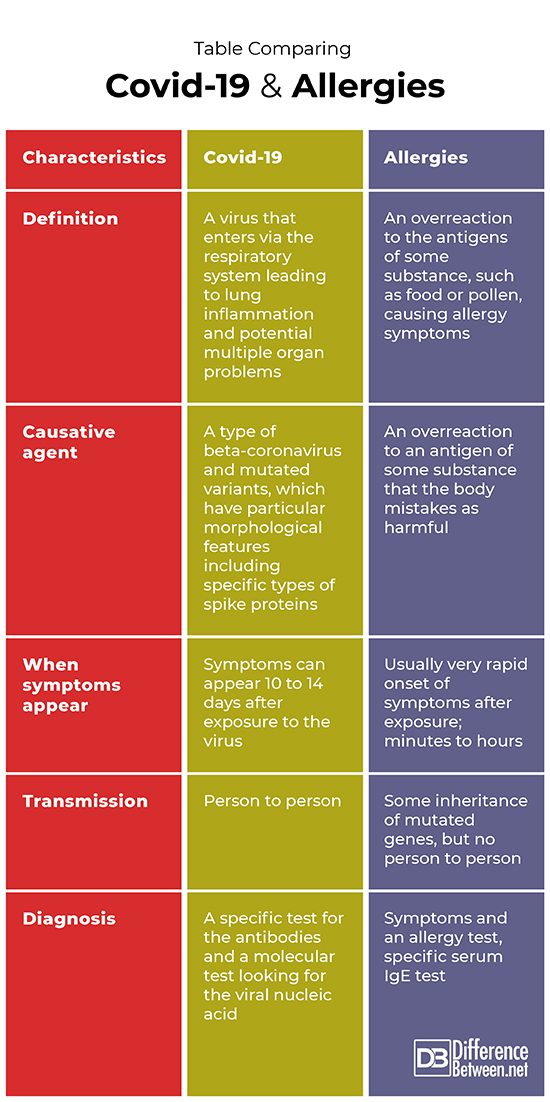Difference Between Covid-19 and Allergies
Allergies are responses by the immune system to some substance that the body is exposed to. Covid-19 is a beta-coronavirus that causes a respiratory illness.

What is Covid-19?
Definition:
Covid-19 is a respiratory illness that is due to a person catching this particular type of coronavirus or one of the new mutated variants of Covid-19.
Symptoms:
Classic symptoms include the development of a dry cough, which can rapidly worsen over time. People also usually develop a high fever and may have pain and difficulty with breathing. Loss of smell and taste are also quite common and in some cases, the virus can affect the nervous system too.
Complications:
Covid-19 can result in problems with the blood-clotting mechanism; people may also need to be placed on a ventilator as they cease to properly oxygenate their blood. Kidney failure and respiratory failure can quickly lead to death; long term complications for people who do survive include lung damage and fatigue.
Diagnosis:
The definitive diagnosis of Covid-19 is based on either a test for the antibodies of the virus showing exposure, or using a nucleic acid test based on RT-PCR.
Transmission:
The Covid-19 virus is contagious and now the newer variants of the virus are believed to be as much as 70% more transmissible in certain cases.
Risk factors and mortality:
Your risk increases if you work in healthcare and are looking after people infected with Covid. Not practicing social distancing and attending events with crowds of people also increases chances of exposure to the virus. Males seem to be at higher risk of more severe infection than female as are people with comorbidities like heart and lung problems. Mortality rate varies by age with older people more likely to succumb.
Treatment:
Treatment is limited and mainly involves painkillers and supplemental oxygen. Patients are given supportive care until the body can recover. In severe cases, mechanical ventilation may be required. Covid-19 vaccination programs have begun in order to try to reduce the transmission of the virus.

What is Allergies?
Definition:
An allergy is some overreaction of the immune system to an allergen from a substance. When the body detects an allergen, the immune response is triggered.
Symptoms:
Allergy symptoms include a runny nose, red and watering eyes, itchy rashes and hives. People may also sneeze, cough, and feel congested. Tissues may also swell in response to the allergen. However, a person never develops a fever as the symptoms are not due to an infection, but rather the immune system overreacting. Covid-19 can be confused with allergies as symptoms are similar, but with allergies there is no fever.
Complications:
The dangerous complication of allergy is anaphylactic shock. This is when the immune response is so severe and extreme that a person may stop breathing, this is because the airways often swell up and close making it impossible to breathe. Swift intervention is needed to avoid death in these cases.
Diagnosis:
Specific serum IgE tests can be done for definitive diagnosis of an allergy, but often a doctor uses the symptoms a person experiences along with a clinical examination to decide on diagnosis.
Transmission:
Allergies cannot be transmitted from one person to another, but in some cases, there may be genes that make a person susceptible to allergies. For instance, peanut allergy appears to be, at least, partly genetically determined.
Risk factors and mortality:
Certain genes make one more likely to develop allergies, but chronic exposure to environmental pollutants such as smoke can also lead to allergic reactions. Mortality from allergies is rare, but if a person goes into anaphylactic shock, then without treatment, the likelihood of dying is high.
Treatment:
Treatment is usually taking an antihistamine such as Benadryl, which stops the effect of histamine being produced by your immune system; histamine is the chemical that triggers the immune response. People vulnerable to anaphylaxis need to carry an EpiPen, which is a device that contains epinephrine that the person can inject into themselves. The epinephrine can work to reverse the dangerous effects of the reaction.
Difference between Covid-19 and Allergies?
Definition
Covid-19 is a viral infection that has a harmful effect on the respiratory system, including the lungs. Allergies are immune system overreactions to some type of substance in the environment.
Causative agent
Covid-19 is a type of beta-coronavirus, which has particular morphological features including specific types of spike proteins. An allergy is when there is an overreaction to an antigen of some substance that the body mistakes as harmful.
When symptoms occur
It can take 10 to 14 days to see symptoms of a Covid infection. An allergic response is usually very fast, in minutes or hours.
Transmission
Transmission of Covid-18 is from one person to another through respiratory droplets. People with allergies are not contagious, but allergies may be linked to genes which are passed down from parent to child.
Diagnosis
The diagnosis of Covid-19 is via tests looking for antibodies to the virus or molecular tests in which viral nucleic acid is detected. The diagnosis of allergies is usually based on the symptoms, but can include a specific serum IgE test.
Table comparing Covid-19 and Allergies

Summary of Covid-19 Vs. Allergies
- Covid-19 is a virus that causes respiratory symptoms and is transmitted among people.
- Allergies are not contagious and are due to reactions of the immune system to substances in the environment.
- There is some evidence that allergies can be inherited.
- Difference Between Rumination and Regurgitation - June 13, 2024
- Difference Between Pyelectasis and Hydronephrosis - June 4, 2024
- Difference Between Cellulitis and Erysipelas - June 1, 2024
Search DifferenceBetween.net :
Leave a Response
References :
[0]Akpan, Nsikan. “new-coronavirus-spreading-between-humans-how-it-started”. National Geographic, 2020, https://www.nationalgeographic.com/science/2020/01/new-coronavirus-spreading-between-humans-how-it-started/
[1]Delves, Peter J. "Overview of Allergic Reactions” MSD Manual Consumer Version, 2020, https://www.msdmanuals.com/home/immune-disorders/allergic-reactions-and-other-hypersensitivity-disorders/overview-of-allergic-reactions
[2]Marshall, Michael. "How COVID-19 can damage the brain." Nature 585.7825 (2020): 342-343.
[3]Image credit: https://innovativegenomics.org/wp-content/uploads/2020/04/red-and-sky-blue-single-virion.png
[4]Image credit: https://commons.wikimedia.org/wiki/File:Allergies_-_When_nature_attacks.jpg
